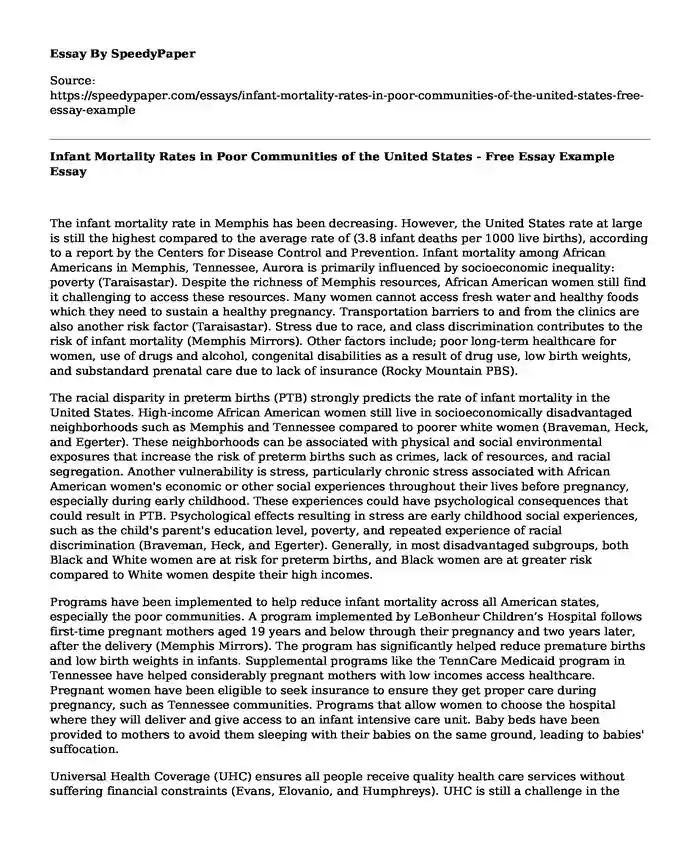
| Type of paper: | Essay |
| Categories: | Health and Social Care United States Childhood Community |
| Pages: | 3 |
| Wordcount: | 720 words |
The infant mortality rate in Memphis has been decreasing. However, the United States rate at large is still the highest compared to the average rate of (3.8 infant deaths per 1000 live births), according to a report by the Centers for Disease Control and Prevention. Infant mortality among African Americans in Memphis, Tennessee, Aurora is primarily influenced by socioeconomic inequality: poverty (Taraisastar). Despite the richness of Memphis resources, African American women still find it challenging to access these resources. Many women cannot access fresh water and healthy foods which they need to sustain a healthy pregnancy. Transportation barriers to and from the clinics are also another risk factor (Taraisastar). Stress due to race, and class discrimination contributes to the risk of infant mortality (Memphis Mirrors). Other factors include; poor long-term healthcare for women, use of drugs and alcohol, congenital disabilities as a result of drug use, low birth weights, and substandard prenatal care due to lack of insurance (Rocky Mountain PBS).
The racial disparity in preterm births (PTB) strongly predicts the rate of infant mortality in the United States. High-income African American women still live in socioeconomically disadvantaged neighborhoods such as Memphis and Tennessee compared to poorer white women (Braveman, Heck, and Egerter). These neighborhoods can be associated with physical and social environmental exposures that increase the risk of preterm births such as crimes, lack of resources, and racial segregation. Another vulnerability is stress, particularly chronic stress associated with African American women's economic or other social experiences throughout their lives before pregnancy, especially during early childhood. These experiences could have psychological consequences that could result in PTB. Psychological effects resulting in stress are early childhood social experiences, such as the child's parent's education level, poverty, and repeated experience of racial discrimination (Braveman, Heck, and Egerter). Generally, in most disadvantaged subgroups, both Black and White women are at risk for preterm births, and Black women are at greater risk compared to White women despite their high incomes.
Programs have been implemented to help reduce infant mortality across all American states, especially the poor communities. A program implemented by LeBonheur Children’s Hospital follows first-time pregnant mothers aged 19 years and below through their pregnancy and two years later, after the delivery (Memphis Mirrors). The program has significantly helped reduce premature births and low birth weights in infants. Supplemental programs like the TennCare Medicaid program in Tennessee have helped considerably pregnant mothers with low incomes access healthcare. Pregnant women have been eligible to seek insurance to ensure they get proper care during pregnancy, such as Tennessee communities. Programs that allow women to choose the hospital where they will deliver and give access to an infant intensive care unit. Baby beds have been provided to mothers to avoid them sleeping with their babies on the same ground, leading to babies' suffocation.
Universal Health Coverage (UHC) ensures all people receive quality health care services without suffering financial constraints (Evans, Elovanio, and Humphreys). UHC is still a challenge in the United States. Healthcare workers should compel their arguments to implement health funding policies that promote efficiency, effectiveness, and healthcare equity through UHC being a political process (Evans, Elovanio, and Humphreys). A statistical study conducted on 153 countries published by The Lancet shows that health coverage leads to better access to care and improved population health.
Conclusion
In conclusion, access to healthcare in Memphis, Tennessee, and other low-income communities still poses a challenge to African American pregnant women. Racial discrimination among African American women is the leading contributor to infant mortality and preterm births. Despite programs that have been implemented, infant mortality is still a challenge in the United States. Healthcare workers should be on the frontline compelling their arguments for universal health coverage to ensure equal access to quality health services.
Works Cited
Braveman, Paula A, Katherine Heck, and Susan Egerter. "The Role of Socioeconomic Factors in Black-White Disparities in Preterm Birth." Am J Public Health (2015).
Evans D, R Elovanio and G Humphreys. "World Health Report 2010." Health System Financing; the path to universal coverage (2010).
Memphis Mirrors. 30 November 2015. Memphis Mirror website. <www.memphismirrror.com>.Rocky Mountain PBS. Insight With John Ferrugia: Marijuana Moms. 2017, https://www.youtube.com/watch?v=nkMjlvgGQs0. Accessed 3 Oct 2020.
Taraisastar. High Infant Mortality Program Babyland Tannessee. 2020, https://www.youtube.com/watch?v=FmK5pwb_qBQ. Accessed 3 Oct 2020.
Taraisastar. Babies In Memphis - Babyland - Premature Babies. 2020, https://www.youtube.com/watch?v=0loVlRVprKI. Accessed 3 Oct 2020.
Cite this page
Infant Mortality Rates in Poor Communities of the United States - Free Essay Example. (2024, Jan 05). Retrieved from https://speedypaper.com/essays/infant-mortality-rates-in-poor-communities-of-the-united-states-free-essay-example
Request Removal
If you are the original author of this essay and no longer wish to have it published on the SpeedyPaper website, please click below to request its removal:
- Essay Sample Describing the Effect of Vegetarian Diet on Weight Reduction
- Essay Example on A Comparative Perspective in Organized Crime
- Essay Sample on The Politics of Healthy Aging
- Under What Conditions Should Abortion Be Permissible? Essay Sample
- The Focus of Treatment - Free Essay Example
- Essay Sample on Retiree Medical and Prescription Coverage
- The Resurgence of Vintage T-Shirts in the United States - Essay Sample
Popular categories




